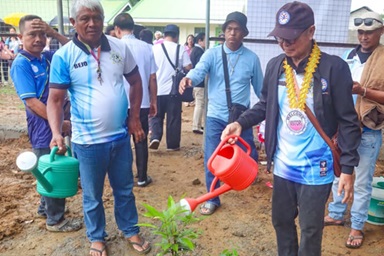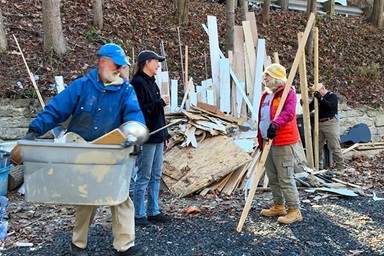Six months after one of the worst storms to ever hit the United States, houses are rotting in mold, bent and twisted church signs stand vigil over places where thriving congregations once worshipped and people are in deep grief.
The Rev. Elijah Mitchell, a United Methodist regional storm disaster coordinator, knows many of the people along the Gulf Coast in Mississippi feel forgotten in the aftermath of Hurricane Katrina. He makes it his daily mission to let them know someone cares.
"I am responsible for 98 square miles of destruction," he says, describing his job. He puts devastated homeowners together with groups eager to help.
He was assigned to the region by Mississippi Bishop Hope Morgan Ward in October after his two churches, St. Rock United Methodist Church in Waveland and Seashore Mission in Biloxi, were destroyed by the storm.
Working out of a small office in Gulfport's Gateway United Methodist Church, Mitchell and his wife, Miriam, send teams out to homes, churches and camps.
On this day in early March, Mitchell has more than 100 people sleeping in Gateway's Sunday school rooms, halls and sanctuary. A typical day for him starts at 4:30 a.m. and doesn't end until late at night.
The Rev. David Jones, a friend and pastor from Oklahoma, has come to Gulfport to help Mitchell but so far hasn't been able to relieve him from the long days and nights.
"I will do the devotions tonight; that will help him some," Jones says.
Mitchell is a storm victim as well as the disaster relief coordinator, having suffered the loss of his parsonage in Biloxi. "Fortunately, I did have a second home," he says.
The day the storm hit, he was at his second home because he was "just too tired to drive back to this end of town," he says. He and his family helped evacuate as many church members as possible before the hurricane struck.
"I can remember the first five days after hurricane," he says. Days of no electricity, of standing in the hot sun for hours to get water, ice and food.
Though many of the stores and restaurants are still out of business he says, "It has gotten a lot better. If you look at the traffic today you could never tell we were in a crisis state."
Mitchell worries about the next hurricane season and is trying to prepare. Warehouses were hard to find after Katrina, he says, and they are needed for storing building materials and supplies such as forklifts. Finding housing for volunteers is also a challenge.
A team of volunteers from the Indiana conferences is helping with that problem.
Hoosiers to the rescue
United Methodists from Indiana have pledged to build a facility behind Heritage United Methodist Church in D'Iberville, Miss., that will house 40 volunteers. The 50-by-75 foot steel structure was buzzing with folks putting bunk beds together and installing walls the first week of March.
Mitchell says this team from Indiana is helping with one of his biggest headaches-finding room for the thousands of volunteers wanting to come to the state to help.
"People are staying all over the church right now," says Gary Walla, part of the Indiana team working at Heritage Church. He fears that after a year, the "welcome" might wear off. "They need their church back," he says.
Three to six teams will be working to finish the Seashore District Volunteer Center by early May. It will probably be needed for relief work for five years, then will become part of Heritage United Methodist Church, organizers say.
The Mississippi Conference has pledged to raise the $200,000 that will be needed to finish the structure. As of March 22, $76,264 has been received from Indiana churches as well as several other states, including Mississippi. More than 230 volunteers have registered to work on one-week builds.
Looking ahead
Mitchell says his work has three phases: emergency, relief and long-term recovery. Today, Mississippi is in the second phase.
As the teams go out to work, Mitchell tells them the key to success is flexibility. Giving people time to work through their grief is one of the most important tasks mission teams will do, he says.
"I tell them you might not nail a single nail today; you might just listen to their stories."
*Gilbert is a United Methodist News Service news writer based in Nashville, Tenn.
News media contact: Kathy L. Gilbert, Nashville, Tenn., (615) 742-5470 or [email protected].
Like what you're reading? Support the ministry of UM News! Your support ensures the latest denominational news, dynamic stories and informative articles will continue to connect our global community. Make a tax-deductible donation at ResourceUMC.org/GiveUMCom.



